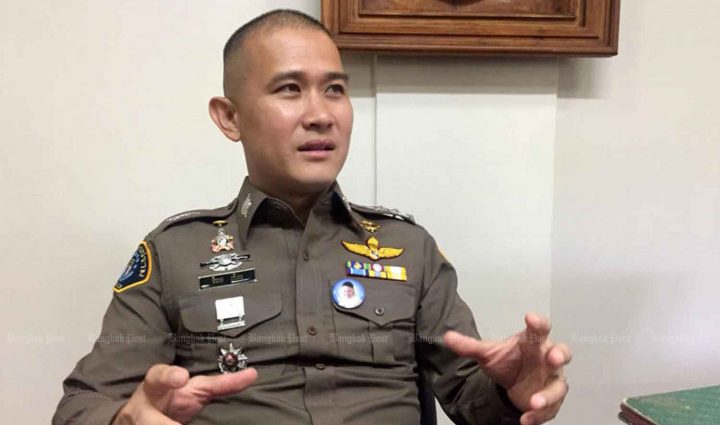
The Royal Thai Police (RTP) is intensifying its crackdown on illegal firearms, as firearms offences continue to rise despite recent heavier punishments being introduced to tackle the problem.
The recent shootout at a restaurant in downtown Ubon Ratchathani and the accidental fatal shooting of a student in a Nonthaburi classroom are glaring examples, according to police.
On Friday, Prime Minister Prayut Chan-o-cha ordered police to tackle the problem within three months, with one key instruction being that officers must safeguard their weapon storage facilities in the wake of the theft of more than 150 guns by a fellow officer.
All stations were instructed to step up weapons checks and ensure firearms are well-guarded and on Oct 18, the cabinet approved measures to prevent them being used against the public, deputy government spokeswoman Traisulee Taisaranakul said.
Pol Snr Sgt Maj Chaowalit Phumkhachorn was arrested on Thursday at a hotel in Nong Khai province in connection with the theft of a total of 159 guns from Pak Kret station. Police say 50 of the stolen guns have been recovered, most returned anonymously.
National police chief Pol Gen Damrongsak Kittiprapas recently instructed Pol Lt Gen Jiraphob Bhuridej, commissioner of the Central Investigation Bureau (CIB), to set up a working panel to combat illegal firearms, which are often linked to illegal drugs.
Tightened controls
Pol Lt Gen Jiraphob told the Bangkok Post that firearms are used to commit various criminal offences, including drug trafficking, theft and mass shootings.
Firearms are also used by transnational organised crime groups such as drug traffickers and human traffickers, he said, adding crimes involving the use of weapons inflict heavy damage on the public.
He said firearms-related problems stem from regulations that allow people to obtain firearms easily, and illegal online arms trafficking.
There are also illegal firearm production facilities, gangs that illegally modify firearms for sale and arms smuggling from neighbouring countries, Pol Lt Gen Jiraphob said.
“People are able to [obtain] guns too easily,” he said. “There is also a lack of clear regulations to control ammunition. Legal loopholes need to be closed.”
On Oct 1, 61 suspects were arrested with 145 firearms and almost 9,000 rounds of ammunition seized as part of a nationwide operation dubbed “Ghost Guns Operation, Season 2”, covering 126 locations which police say will help stamp out the illegal online arms trade.
“I believe the operation will help boost public safety,” he said. “But a sustainable solution to the problem is to tighten controls and prevent the use of weapons.”
The qualifications to own firearms must be reviewed annually and licences must be revoked if owners do not meet the requirements, he said.
Licences must also be checked regularly to prevent weapons from being sold in the black market while a cap should be imposed on the number of firearms and ammunition owned by each individual, Pol Lt Gen Jiraphob said.
Owners should bring their weapons and ammo for regular checks so information can be stored in databases, he said, noting the information will come in handy when police need to deal with gun crimes.
The number of agencies handling the criminal history and the backgrounds of people applying for gun licences also should be increased to handle workload surges, he said.
Data sharing
The RTP is responsible for checking the criminal history of gun licence applicants before issuing licences, while the Interior Ministry helps scrutinise and screen applicants, Pol Lt Gen Jiraphob said.
However, the agencies keep their databases separate and do not link them together, he said.
“The RTP and the Interior Ministry should work closely together and share more information with each other,” Pol Lt Gen Jiraphob said.
“While the RTP has a database on [criminal suspects], it does not have information regarding types of firearms, bullet casings and cartridges.
“Linking the databases will help police more efficiently check and screen those applying for gun licences.”
He also emphasised the need to check regularly the mental health status of gun owners and those applying for a licence, to ensure they are not mentally disturbed.
More than 60,000 cases involving guns were recorded in 2018 before the number dropped to about 30,000 in 2020 as crackdowns intensified.
Gun crimes were often linked to drug abuse.
“High rates of drug-related offences often occur in areas where rates of gun crimes are also high,” he said, adding gun crimes rank among the top three criminal offences in Thailand.
When it comes to the use of weapons in mass shootings, offenders often target areas where large crowds gather, such as shopping malls, hotels, concerts or events, Pol Lt Gen Jiraphob said.
Curbing risks
Pol Lt Gen Jiraphob said it is important to step up the enforcement of the law to control firearms and ammunition and punish those who break it.
Singapore has both tough laws against drug trafficking and effective law enforcement. Thailand also has penalties for drug traffickers, but law enforcement is far from effective, he said.
“Some convicts re-offend,” he said, adding prisons may become venues where drug convicts build networks before they are released.
“Deterrence by punishment should be the best approach to prevent drug-related offences,” he said.
“State officials involved in the drug trade should also receive harsher punishments than civilians.”

